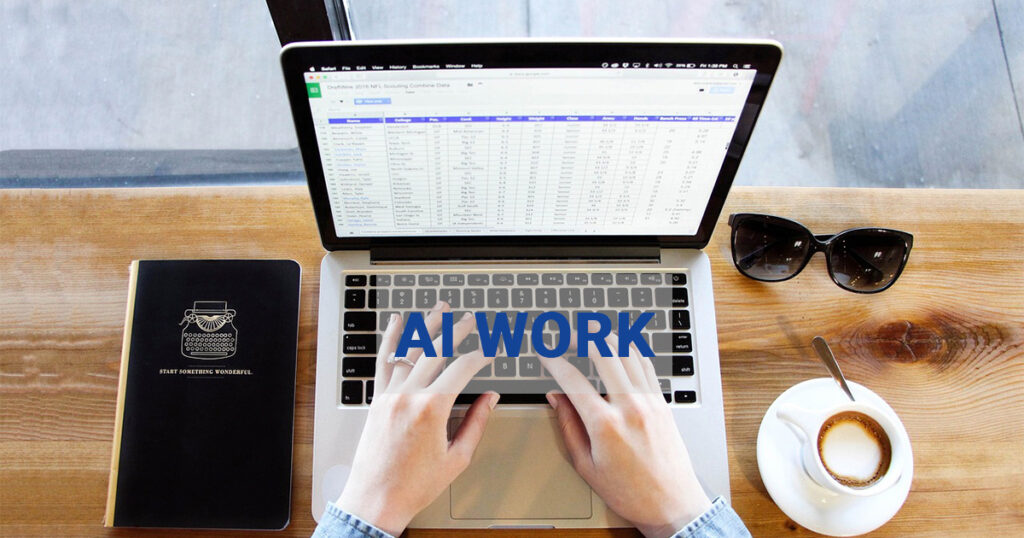AI Work in the Digital Era: Transforming Jobs, Productivity, and the Future

Introduction
Artificial Intelligence (AI) is no longer just a technological buzzword—it has become an essential force shaping the way we live and work. From automation in industries to AI content creation in media, the influence of AI work can be seen everywhere. Businesses are leveraging AI to improve productivity, professionals are adapting to new skill demands, and the future job market is being redesigned around the role of AI.
In this article, we will explore how AI work, digital era AI, artificial intelligence, automation, data analysis, AI content creation, productivity improvement, and the role of AI professionals are changing the global landscape.
1. AI Work: A New Dimension of Professional Life
AI work refers to the application of artificial intelligence across industries and job functions. It involves automating tasks, analyzing data, supporting decision-making, and even creating new forms of content.
Unlike traditional tools, AI is adaptive. It learns from data and user behavior, which means it continues to get better with time. From virtual assistants like ChatGPT and Siri to predictive systems in finance and healthcare, AI work is becoming part of our daily lives.
2. Digital Era AI: The Driving Force of Transformation
The digital era AI revolution has transformed the world into a smarter, faster, and more connected place. Organizations now rely on AI to handle customer queries, optimize logistics, and predict future market demands.
For example, e-commerce companies use AI to recommend products, streaming platforms personalize entertainment, and education platforms provide AI-driven learning experiences. The integration of AI in the digital era has made businesses more competitive while making consumer experiences more personalized.
3. Artificial Intelligence and Automation
One of the most impactful aspects of artificial intelligence is automation. In industries such as manufacturing, transportation, and IT, AI is replacing repetitive manual tasks with automated solutions.
-
In customer support, AI-powered chatbots solve problems instantly.
-
In logistics, AI automates delivery tracking and route optimization.
-
In offices, AI automates email responses, report generation, and scheduling.
While automation raises questions about job loss, it also creates new roles that demand creative, analytical, and problem-solving skills. Instead of replacing humans, AI is pushing them toward higher-value tasks.
4. The Power of Data Analysis in AI Work
Data is the fuel that powers AI. Every business generates huge amounts of data daily—from customer behavior and market insights to product performance. AI data analysis allows organizations to process this information at lightning speed, turning raw numbers into actionable insights.
-
In healthcare, AI analyzes patient data for early disease detection.
-
In finance, it predicts stock movements and fraud detection.
-
In marketing, AI identifies consumer preferences for targeted campaigns.
Without AI-driven data analysis, businesses would struggle to make smart, timely decisions in today’s fast-changing digital economy.
5. AI Content Creation: Shaping the Creative World
Creativity was once thought to be uniquely human, but AI content creation is changing that perception. From generating blog posts and product descriptions to creating videos, music, and graphic designs, AI is reshaping creative industries.
Marketers benefit from AI tools that produce engaging content quickly. Journalists use AI for research and draft creation. Even social media influencers rely on AI-powered editing tools to design appealing posts.
However, human creativity still holds the edge. AI can generate ideas and structure, but originality, emotional depth, and storytelling remain the unique strengths of human creators. Together, AI and humans can create more impactful content than ever before.
6. Improving Productivity with AI Work
Productivity is the backbone of any successful business, and AI offers countless ways to improve productivity.
-
AI-powered project management tools streamline workflows.
-
Automated reminders and scheduling apps save time.
-
Machine learning algorithms analyze performance and suggest improvements.
By reducing repetitive work, AI enables professionals to focus on innovation and strategic thinking. This not only boosts efficiency but also creates a healthier work-life balance for employees.
7. Future Job Market and the Role of AI Professionals
The future job market will be deeply influenced by AI. Roles like AI engineers, machine learning experts, and data scientists are in high demand, while traditional jobs are evolving with AI integration.
For instance, teachers are using AI to personalize education, doctors are adopting AI-powered diagnostic tools, and marketers are using predictive analytics to understand consumer behavior.
At the heart of this transformation are AI professionals. Their role goes beyond technical expertise—they help organizations implement AI responsibly, ensuring ethical use, data security, and fair practices. The role of AI is not just about machines replacing humans; it’s about humans and AI working together to build smarter, more efficient systems.

Conclusion
AI is not just a trend—it is the future. From automation and data analysis to AI content creation and productivity improvement, its impact is visible across every industry. As the digital era evolves, the role of AI professionals will be critical in guiding this transformation ethically and effectively.
Those who adapt, upskill, and embrace AI work will thrive in the future job market. The time to understand and adopt AI is now.
FAQs (WS Questions)
1. What is AI work and why is it important?
AI work refers to the use of artificial intelligence in various industries to automate tasks, analyze data, create content, and improve productivity. It is important because it drives efficiency and innovation.
2. How does AI impact the digital era?
AI enhances customer experience, improves decision-making, and makes businesses more competitive by enabling faster, smarter solutions.
3. Will automation replace human jobs completely?
No. While automation may replace repetitive tasks, it also creates new job opportunities that require creativity, problem-solving, and advanced technical skills.
4. What role does data analysis play in AI work?
Data analysis helps businesses convert raw information into actionable insights, improving decision-making and strategy development.
5. Can AI create original content?
AI can generate content structures, drafts, and ideas, but true originality and storytelling still rely on human creativity.
6. How will AI affect the future job market?
AI will create demand for new roles such as AI engineers, data scientists, and digital strategists, while transforming existing professions.
7. What is the role of AI professionals?
AI professionals design, manage, and implement AI systems, ensuring that businesses use them effectively and ethically.
